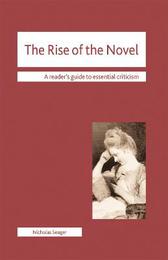
|
The Rise of the Novel
Hardback
Main Details
Description
Why have scholars located the emergence of the novel in eighteenth-century England? What historical forces and stylistic developments helped to turn a disreputable type of writing into an eminent literary form? This Reader's Guide explores the key critical debates and theories about the rising novel, from eighteenth-century assessments through to present day concerns. Nicholas Seager: - Surveys major criticism on authors such as Aphra Behn, Daniel Defoe, Samuel Richardson, Henry Fielding and Jane Austen - Covers a range of critical approaches and topics including feminism, historicism, postcolonialism and print culture - Demonstrates how critical work is interrelated, allowing readers to discern trends in the critical conversation. Approachable and stimulating, this is an invaluable introduction for anyone studying the origins of the novel and the surrounding body of scholarship.
Author Biography
NICHOLAS SEAGER is Lecturer in English Literature at Keele University, UK.
Reviews'Each chapter lucidly summarizes important critical texts as well as writers of the time, including Henry Fielding, Samuel Richardson, Jane Austen, and Apra Behn. The author offers a comprehensive yet concise overview of the rise of the novel that will benefit students and teachers of English literature. Recommended reading.' - Choice 'A remarkably comprehensive, lucid, and well-organised account of 'rise of the novel' criticism from the later seventeenth century to the present. Its judgements about the main lines of this criticism, and its assessments of the issues at stake, are judicious and convincing.' - Shaun Regan, Queen's University Belfast, UK 'The 'rise of the novel' is one of the most contested areas in modern criticism - there's little agreement on what constitutes a 'novel' and when, how, even whether it 'rose.' Mountains of scholarship have been published on the subject, and pity the poor beginner who has to make sense of it. Nicholas Seager deserves thanks for this gentle but rigorous introduction to the arguments over the eighteenth-century novel, a learned, wide-ranging, and scrupulously fair overview of the major accounts of the form.' - Jack Lynch, Rutgers University, USA
|